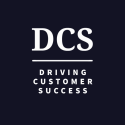5 Daily Habits You Should Form To Avoid Firefighting And Losing Control Of Your Day

I had goosebumps taking this picture yesterday evening when the Eiffel Tower went blue and yellow in support of the people of Ukraine!!
#3 CS Café – 5 Daily Habits You Should Form To Avoid Firefighting And Losing Control Of Your Day
At its core definition, the goal of a Customer Success Manager is to ensure customers get the benefits from using the company’s products or services.
But, what if you could consistently achieve more than just helping customers succeed?
Which fundamental skills could you develop to go beyond expectations and become a rock star CSM that your customers would acclaim, cherish and reward?
Like with any other natural behavior, the first step is to form new habits of doing things others don’t like to do. This is, in fact, the common denominator of every successful person as it requires hard work and dedication.
But as the Chinese philosopher Lao Tzu once said, the journey of a thousand miles begins with one step.
And if you take these small actions every day, you’ll stand out from the crowd and have a tremendous impact on your personal growth, your customers, and the company.
So here are the 5 most important daily habits I believe you should focus on in your quest to become a highly effective CSM:
1. Always put customers first
There is not a single company in the world that would say they are not customer-centric.
Every business identifies itself as always developing products or services to respond to its customers’ needs. But is it always the case?
When we think of all these companies that once ruled the world and which now have disappeared because of their inability to adapt to the customer’s needs, we can easily understand the importance of truly living the “customer first” mindset in practice.
Let’s take an example here: Kodak, founded back in 1888.
If you love photography as I do, you probably remember the tragic story of this once amazing company that then went bankrupt.
Indeed.
Kodak dominated the photographic film market worldwide. A few of their taglines have even become industry references, e.g. “Make it a Kodak moment” or “You press the button, we do the rest” which was an advertising slogan by George Eastman, the company’s founder himself.
At that time, Kodak understood its customers’ needs and desires but failed to adapt to change when consumers started uploading photos from their phones onto computers, rather than sending them for development and printing as they had done previously.
And over time, the rise of digital photography made all of Kodak’s products obsolete, mainly film and photographic paper: a simple smartphone and a computer replaced all of them. The company’s business went so bad that in 2012, Kodak had to declare bankruptcy.
So the lesson here is:
If you fail to anticipate changes, you’ll fail to adapt to your customers’ needs too.
You can be the best and most respected brand in the world, but if you focus on your internal interests only, failure will be inevitable.
In Customer Success, the approach is exactly the same:
To keep pace with the ever-changing customer landscape, we must align with our customer’s needs at all times and ask ourselves:
- How well are we listening to our customers?
- Do we listen actively or just pretend to listen and focus on other activities?
So, no matter how you engage with your customers, a great CSM always puts the customer first and considers the situation from the customer’s point of view, and acts accordingly in the best interest of all parties.
2. Define what success means for your customers
To achieve any specific goal, you need to be able to define what you’d consider as a “win”.
I personally like to see it from a ship and its captain’s perspective.
If you set a clear and intangible destination and work relentlessly to achieve your objective, most of the time, you’ll arrive where you wanted to be in the first place.
In contrast, without any clearly identified arrival port, you’ll know where you are departing from, but you might end up not even leaving the port, turning around headless.
So, challenging your customers by asking them how they define success is a great way to dive into customers’ needs so you can help identify their goals, write them down clearly, and set your plans to achieve them within the expected time frame.
Again, here are some of the questions we should ask customers to develop:
- What does success look like to you in practice?
- What would be the ideal outcome for you? What would you consider a success?
- What are you expecting from our partnership?
Note the importance of putting your customers at the center of your discussions, using “you” as opposed to “I” or “me”.
So, no matter how complex the customer’s goals can be, a great CSM always has a clear understanding of what success means for their customers.
3. Look to add value to every single interaction
As Newton once said: “for every action, there is always an equal and opposite reaction”.
And so it is when discussing with your customers: you have to “give” first without the expectation of receiving anything, so you can receive in return.
The more you provide meaningful insights to your customers, the more you’ll get as per the principle of reciprocity.
In practice, the most basic way to do so is to keep asking questions, so you can demonstrate your engagement.
While doing so, it’s important to do your homework and search for the topics, so you can drive even more insightful conversations.
And as your teams scale over time, it’s also critical to have the right organization and processes in place so you can keep adding value even when there is no CSM assigned to the account.
So, no matter the level of interactions you have daily with your customers, a great CSM always thinks “value first” to be able to build stronger partnerships over time.
4. Collect feedback for continuous improvement
Simply said, feedback is any type of information or insights that your customers share about their experiences with you, the company, its products, or services.
Have you noticed how appreciative people are when being asked about their thoughts?
Whenever you take a specific action, always ask for feedback to see how you can do better over time.
It’s a powerful way to build trust, show dedication to your customers, and that you genuinely care about their opinion, which matters for you and the company.
As a CSM, your objective is to stay as close as you can to your customers’ needs and listen to their concerns.
So, no matter how positive or sometimes negative feedback can be, a proficient CSM always seeks continuous improvement opportunities.
5. Always go the extra mile
One of the most important principles of success is about going the extra mile, a road where there is not much competition indeed.
The simple fact that you deliver more than what’s expected from you will reinforce your position and showcase the difference you are making with your customers.
Elevating your standards is part of creating positive habits your customers will always appreciate and reward you for.
Examples of going the extra mile can be as simple as responding to your customers’ inquiries in a timely manner with proper follow-ups or proactively reaching out to inform them about a product update that could help them resolve a long-time concern.
There is no need to have a complex methodology but simple intentions to show how much you value your relationships with your customers.
By going that little extra mile, you are not only achieving success but also inspiring others around you in the process.
In the end, it’s more about making that extra effort to go a little further than doing just your job as a CSM. This is the difference between being average versus being a top performer any CS professional would aspire to become.
So, no matter the challenge, a rock star CSM will always go the extra mile to deliver more than expected.
Isn’t it?
Well, these were the 5 daily habits you should form as a Customer Success Manager to make a big difference and get ahead in 2022:
1. Always put customers first
2. Define what success means for your customers
3. Look to add value to every single interaction
4. Collect feedback for continuous improvement
5. Always go the extra mile
And there is more! which I’ll continue exploring with you here in the next episodes!
That’s all from me for today.
I hope you enjoyed the read as much as I did the preparation, and thanks for subscribing!
If you’ve found these notes helpful, please share and help others find and subscribe as well.
Can’t wait to meet with you next Sunday at our Customer Success Café again!
There is no success without empathy for others.
And in particular right now during these tragic times,
“Peace cannot be kept by force; it can only be achieved by understanding.”
– Albert Einstein
So let’s aim to understand each other for Peace to prevail!
I wish you a great Sunday and a fulfilling week ahead!
Hakan.
Twitter: follow me @DrivingCS
Linkedin: let’s connect!
For top daily CS news from Silicon Valley to Paris and beyond, visit DrivingCustomerSuccess.com
Are you looking for a career change to transition into Customer Success? check out my book to learn more about what it takes to become a great CSM and hit the ground running!
Top CS news from Silicon Valley to Paris, daily.

Hakan Ozturk
Founder, theCScafe.com, #1 Weekly Customer Success Newsletter
Hakan Ozturk is a Paris-based Customer Success leader with over 15 years of experience in the computer software industry. Passionate about driving growth and delivering value to strategic customers, Hakan has established himself as a trusted industry expert. As the Founder of The Customer Success Café Newsletter and TopCSjobs.com, Hakan provides valuable industry insights and daily-updated job opportunities worldwide in the field of Customer Success. Connect with Hakan to boost your career in CS and your company’s potential for massive growth.

Leave a Reply